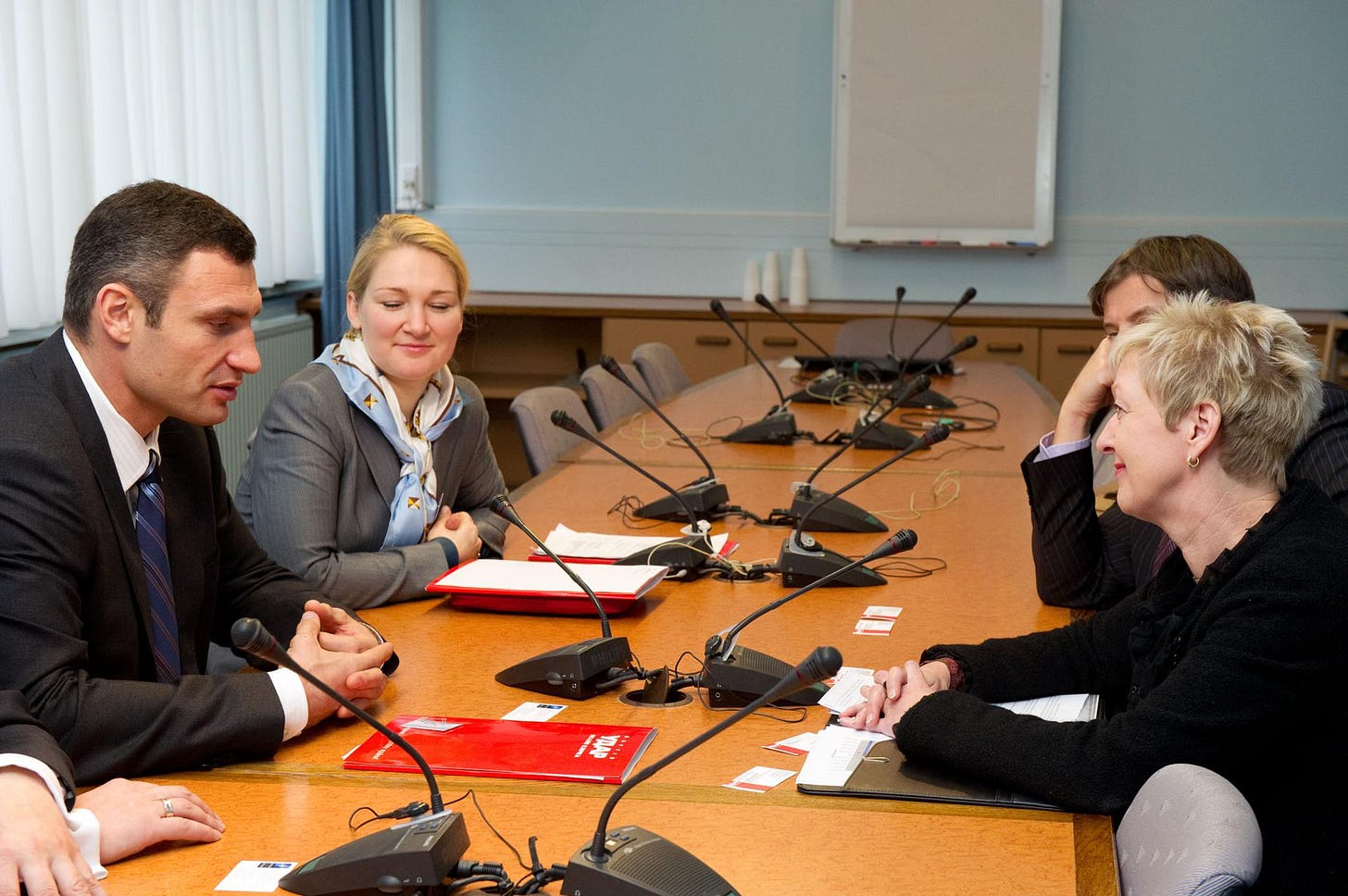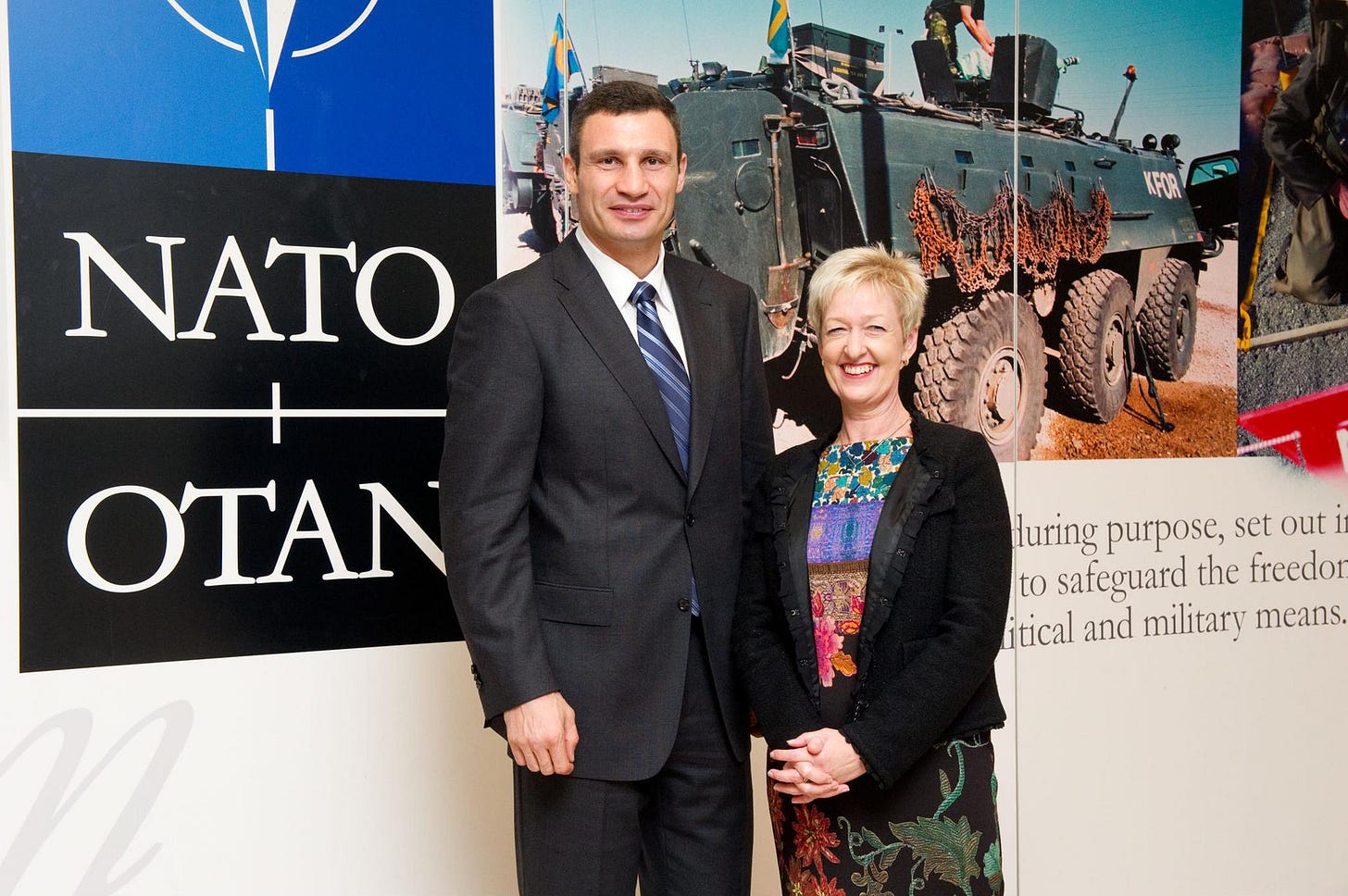Between Bucharest and Washington: My 'NATO inside' views about Ukrainian membership ('Blind Spots', chapter 3)
Going full circle - Between NATO's Open Door and Russia's veto power
Dear Reader,
In 2008, I sat in the NATO-Russia Council meeting at the Bucharest summit, witnessing how the allies granted Russia a veto over Ukraine’s and Georgia’s prospects to join NATO. In 2010, I sat in the NATO summit meetings in Lisbon, listening to the many explanations offered by NATO leaders why they judged it impossible to bring Ukraine and Georgia closer to NATO membership. During the subsequent years I sat in many NATO summit and ministerial-level meetings where Ukraine’s aspirations to join the transatlantic alliance were discussed - - postponed and ultimately dismissed.
While over the past 16 years (sic!) the NATO allies adapted and changed their agreed language in numerous Summit declarations and invented various new formats to engage the Ukrainian government, they have neither succeeded to muster the political will to start accession talks with Ukraine (and Georgia), nor have they been willing and able to sketch out a clear roadmap or timetable for Ukraine’s admission to the transatlantic alliance.
NATO’s jubilee summit that took place in Washington, D.C. earlier this past week did not make a difference. Apart from offering the usual political rhetoric about ‘the NATO allies’ unwavering solidarity with the people of Ukraine in the heroic defense of their nation’ , the summit declaration simply states that the ‘NATO allies will continue to support Ukraine on its irreversible path towards Euro-Atlantic integration, including NATO membership. We affirm that we will be in a position to extent an invitation to Ukraine to join the Alliance when Allies agree and condition are met.” (paragraph 16)
Irreversible? Sounds grandiose and promising. But compared to the respective statement made at the previous NATO summit in the Lithuanian capital Vilnius, the political outcome remains unchanged. The allies added the word ‘ irreversible’ but did not alter the language they agreed in Vilnius: they will only invite Ukraine when they can agree and conditions are met. Since ist is unclear if ever and when the allies will be able to mount consensus on this strategic issue and since they do not specify to which concrete conditions they refer, NATO’s overall political intent remains vague.
The Kremlin must be pleased. It’s Chinese friends, too. But Ukrainians could only show a brave face in Washington.
They will have to continue to wait outside the NATO fence; they will receive some military, economic and financial means to defend against the Russian aggressor but remain still far from from finding shelter under the conventional and nuclear security umbrella of an organization that proudly calls itself the ‘most successful military alliance in history’.
In the past 16 years I have been arguing that the NATO allies’ hesitation and/or even staunch opposition to embrace Ukraine as a full member is a fatal strategic mistake. It sends the wrong strategic message towards the Russian regime which doesn’t only seek to destroy the independent and democratic Ukrainian state with brute military force but tries to impose a new ‘Yalta order’ on Europe; a security arrangement that grants Moscow the full veto power over the rules of the game.
I don’t want to ponder here over the many arguments and counterarguments about Ukraine’s membership in NATO that have been exchanged among policymakers and security pundits in endless conversations in the past 16 years.
Instead I would like to share with you a recollection of a meeting that I had with Vitali Klitschko, mayor of Kyiv since 2014, in the NATO headquarters many years ago. In our meeting in Brussels in November 2011 we discussed Ukraine’s prospects to become a full-fledged member of the alliance. It seems to me that since we haven’t moved forward but rather go in circles.
So here is one of many personal ‘NATO inside stories’ that I described in ‘Blind Spots’. I hope you find it interesting.
Talk soon again, Stefanie
***************************************************************************
From: Blind Spots, April 2023, Chapter 3
“At the NATO summit in Bucharest, Romania, in early April 2008, both Georgia and Ukraine had officially asked to be included in the Membership Action Plan, the preparatory programme for NATO aspirants. However, the Allies could not find consensus on this. While the U.S. administration under President George W. Bush and several Eastern European allies supported this step, Germany and France in particular were against it. The result was a compromise that, as it later turned out, was fatal. Ukraine and Georgia were offered the prospect of NATO membership, but the Alliance left the timeframe open. Both countries were denied admission to the preparatory programme for aspirant countries.
Brussels, NATO headquarters, November 2011: ‘What does Ukraine need to do to get closer to joining NATO?’ Sitting across from me is Vitali Klitschko, former world heavyweight champion. As the newly elected leader of the Ukrainian Democratic Alliance for Reform (UDAR), he wants to run as its top candidate in next year’s parliamentary elections. He explains that foreign and defence policy issues are just as important to him as economic and social issues. The Konrad Adenauer Foundation in Brussels asked for a meeting with NATO. After a lot of back and forth with the Secretary General’s cabinet, Klitschko ended up with me. He does not let on how he feels about this; he may well be disappointed that I am the person sitting opposite him instead of Anders Fogh Rasmussen.
‘Do you want to hear NATO’s official line, or my own opinion?’ I ask in return.
‘Both would be nice.’ His eyes are fixed intently on me.
‘Before Ukraine can be invited into the official Membership Action Plan, it must continue to work on reforms. These reforms should concern all areas of government: defence, politics, the economy, and rule of law. The allies want to see that the Ukrainian government is fighting corruption consistently and is continuing to work on consolidating democratic institutions—’
‘Yes, that’s what I heard this morning during my talks with the EU,’ Vitali interrupts. ‘But what does that actually mean? Ukraine has participated in nearly every NATO operation in recent years. We supported you in Kosovo, in Bosnia and Herzegovina, and in Afghanistan. We were even with you in Iraq. Our forces also supported NATO maritime operations in the Mediterranean and the Horn of Africa.’ Vitali takes a breath before saying, ‘We are currently participating in 10 NATO programmes to improve our defence structures. What more can we do?’
Vitali has done his homework. He is well informed about the various partnership programmes between Ukraine and NATO.
‘Well, you’re going to have to convince two nations in particular: Germany and France. They are against Ukraine joining the Membership Action Plan as they worry Moscow will see it as a provocation. As long as this attitude persists, there will be no consensus among the allies. And Ukraine will be on hold forever.’
‘But Russia is becoming more authoritarian and aggressive by the second. Look at Georgia. Moscow could threaten us directly too, one day.’ Vitali gives me a questioning look.
‘In my eyes, you have three course of action,’ I reply. ‘First, stay on the course of reform. Don’t give the allies any reason – none whatsoever – to accuse Ukraine of being behind on reform. Second, continue to work on strengthening your national defence capabilities. As long as Ukraine is only a partner of NATO, the allies will not step into the firing line for you. And third, create a political support group. Rally a circle of NATO countries that would be prepared to lobby Berlin and Paris diplomatically. A group that will aggressively promote Ukraine’s accession to NATO. This should ideally include Washington.’
‘Thank you for your honesty.’
Vitali and I look almost simultaneously at the clock hanging on the wall. We have been sitting together for over an hour.
‘From the bottom of my heart, I wish you good luck,’ I say as I stand up, trying an encouraging smile. Vitali’s handshake is firm. We take a few more photos in front of the NATO logo and then I escort Vitali towards the exit. I return to my office depressed.”



